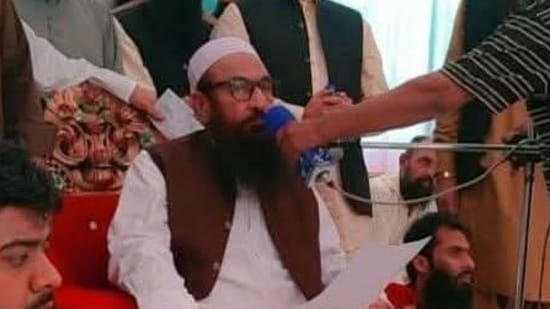Abdul Rehman Makki, a senior leader of the Lashkar-e-Taiba (LeT), and a key figure accused of orchestrating the 26/11 Mumbai terror attacks, has reportedly died in Pakistan. His death marks the end of a controversial life tied to one of the most tragic and high-profile terror attacks in Indian history. Makki, a prominent member of the Pakistan-based militant group, was heavily involved in the planning and execution of the devastating attacks that claimed the lives of over 170 people in Mumbai in November 2008.
The 26/11 Mumbai Attacks: A Recap of the Tragedy
The 26/11 Mumbai attacks, one of the most horrific terrorist attacks on Indian soil, unfolded over four days, beginning on November 26, 2008. A group of ten armed militants, affiliated with the LeT, hijacked boats and stormed several locations across the city, including the Taj Mahal Palace Hotel, Oberoi Trident Hotel, CST Railway Station, and Nariman House. The attack was meticulously planned, and its execution was brutal, with the terrorists using firearms, grenades, and explosives to wreak havoc.
The terrorist assault left 164 people dead, including 26 foreign nationals, and over 300 others were injured. The attackers targeted innocent civilians, security personnel, and international guests. The siege also captured the attention of the global community, as it revealed the scale of cross-border terrorism and the vulnerability of major metropolitan cities to such attacks.
In the aftermath, investigations revealed the involvement of various key figures in the LeT, including Abdul Rehman Makki. Makki was linked to the planning, funding, and coordination of the attacks, which were later described as an attack on India’s sovereignty and security. His role in the operation made him one of the most wanted individuals for Indian authorities, with Interpol issuing a Red Corner Notice against him.
Who Was Abdul Rehman Makki?
Abdul Rehman Makki was a high-ranking member of the Lashkar-e-Taiba and served as the deputy to the group’s founder, Hafiz Saeed. Known for his fiery rhetoric and leadership in the militant group’s operations, Makki was considered a key strategist and propagandist for LeT. His involvement in spreading extremism and organizing terrorist operations in South Asia, particularly in India, made him a highly influential figure in Pakistan’s terrorist network.
Makki was also implicated in a range of other attacks targeting India, as well as supporting insurgency operations in Kashmir. Despite his involvement in numerous terrorist activities, he was never apprehended by Pakistani authorities. Pakistan, which has long been accused of sheltering terrorists, has failed to take substantial action against Makki, drawing widespread criticism from India and the international community.
Over the years, Makki continued to operate freely from Pakistan, where he was involved in recruiting new militants, raising funds for LeT operations, and overseeing logistical operations. His name became synonymous with the ideology of violent jihadism that LeT propagated, and his influence extended beyond India, with his speeches inciting radical elements in other parts of the world.
The Pakistan Factor: A Haven for Terrorists?
The news of Abdul Rehman Makki’s death raises several questions about Pakistan’s role in sheltering and protecting key figures involved in global terrorism. Despite being labeled a global terrorist by various international agencies, including the United Nations and the United States, Makki remained untouchable in Pakistan for years. His death in Pakistan, under ambiguous circumstances, is unlikely to surprise many, but it continues to highlight Pakistan’s unwillingness or inability to take effective action against terrorist groups operating within its borders.
For years, Pakistan has been accused of harboring individuals responsible for orchestrating deadly attacks on Indian soil, and the country’s refusal to extradite them to face justice has been a point of contention in its diplomatic relations with India. Makki’s death adds to the long list of high-profile terror suspects who have died or continued to evade justice within Pakistan.
India, which has sought the extradition of several individuals linked to the 26/11 attacks, has often expressed frustration over Pakistan’s failure to bring terrorists to justice. Despite evidence of Pakistan-based militant groups’ involvement in the attacks, the country’s government has yet to take substantial action against these groups or their leaders.
Reactions to Makki’s Death
The news of Abdul Rehman Makki’s death has elicited mixed reactions from both India and Pakistan. Indian officials, while acknowledging his role in the 26/11 attacks, have expressed regret that justice has never been served for the victims of the tragedy. For many in India, Makki’s death represents yet another example of how terrorists involved in high-profile attacks evade accountability, as Pakistan continues to shelter figures like him.
On the other hand, Pakistan’s response has been more subdued, with some sources reporting his death due to natural causes, while others speculate about the involvement of rival factions within the country’s militant landscape. Regardless of the circumstances surrounding his death, his legacy as one of the masterminds behind the 26/11 attacks is unlikely to fade quickly.
A Grim Legacy
Abdul Rehman Makki’s death brings to a close the life of one of the most wanted terrorists in the world, but it does not bring closure to the victims of the 26/11 attacks or to the ongoing conflict between India and Pakistan over terrorism. The legacy of Makki’s involvement in the attacks will continue to haunt the memories of those who lost their lives in Mumbai in 2008, and the broader implications of his role in global terrorism will remain a point of contention in international relations.
As India continues to demand justice for the victims of the 26/11 attacks, the death of Makki serves as a reminder of the complex and ongoing battle against terrorism, particularly in regions where state-sponsored terrorism remains a persistent challenge.

